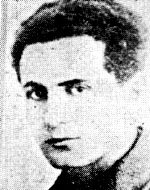Giladi (Green), Eliahu (Shaul)
Son of Rachel and Moshe. He was born in 1915 in Transylvania. As a member of an ultra-Orthodox family, he was sent to study in a yeshiva in the town of Satmar, but he rebelled, left the house and made a living as an apprentice. When he was drafted into the Romanian army, the rebellious young man saw no reason to serve in the army, and fled to Hungary in the hope that he would find a way to immigrate to Eretz Israel.In Budapest, Elijah presented himself to the leaders of the Revisionist movement, Organized by the Betar movement. When he arrived in Israel, he changed his name to Giladi and joined the Irgun.In 1940 the Irgun split, Eliyahu joined the faction that later became known as the Israel Fighters’ Freedom Fighters (Lehi), and its activities excelled in courage and bravery. , “Shaul” (the underground alias of Eliyahu) was also captured by the British Intelligence and sent to the detention camp at Mizra. The years 1941-1941 were difficult years for the young Lehi underground: some of its members were murdered by the British, most of whom were imprisoned and interned in detention camps. In February 1942, the murderer and leader of Lehi Avraham Stern (“Yair”) was also murdered. Outside there was only a small core of trustees. In the prison, Eliyahu was among a group of Lehi prisoners who, with experience, planned to build a deep underground that could survive and fight the British under the harsh conditions of Jewish alienation and the persecution of the British security forces. . During this period of underground activity, his comrades said: “He is daring to the point of madness and human life as nothing in his eyes.” In planning and carrying out Lehi operations, some of which were also connected to the confiscation of funds for underground purposes, Eliyahu did not consider human sacrifices, and his comrades began to fear the speed of his withdrawal, and when his demands were rejected by the Lehi leadership To act against the leaders of the Yishuv, threatened to carry them out on his own, and preached to a group of fighters in one of the courses under his guidance: “No loyalty to anyone – loyalty is to the idea.” In his rebelliousness, his unwillingness to accept authority, and his unacceptable ideas of the Lehi commanders, his comrades saw his organization as a danger to the very existence of the organization. The sentence was executed in the sands of Rishon LeZion, where Elijah was brought on some pretext by friends, and there his body was found buried to this day. Eliyahu was not sentenced by his friends for treason – he was a tragic victim of underground fighting – and 38 years after his execution, Eliahu’s name was included in the list of fallen soldiers in Israel’s wars. His life, work and tragic death were published in the book “History of the Haganah,” in the book “Wanted,” in “Unknown Soldiers” and in the newspapers Maariv and Yedioth Ahronoth. An investigation conducted in 2017 found that he had another name – Shaul. This fallen hero is a “maklan” – a hero whose burial place is unknown.
